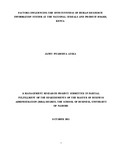| dc.description.abstract | The National Cereals and Produce Board (NCPB) has implemented HRIS in its operations. However, the effectiveness of the HRIS in the organization has not been so pronounced. This may be attributed to various aspects such as lack of competence, lack of capital for infrastructure and user characteristics. Despite the fact that Human Resource Information Systems are being used with increasing frequency in organizations, there is still relatively little research on factors that influence the degree to which HRIS are effectively implemented in organizations resulting in functional versus dysfunctional consequences for individuals and organizations and in conjunction with the ever-increasing demand for HRIS, further research is still needed in this field.
The purpose of this study was to determine the factors influencing effectiveness of human resource information systems at the NCPB. This was a case study since the unit of analysis will be one organization. The population of interest was the management staffs who included top and middle level management staff in the NCPB. A sample of responding staffs was selected by picking 50% of the possible respondents. This generated 14 sample respondents for this study. Primary data was collected using face to face interviews. Being a case study, conceptual content analysis was most useful in analyzing the data. The data was presented in a continuous prose as a qualitative report on the factors influencing HRIS in the National Cereals and Produce Board.
This study concludes that HRIS is used simplify the decision making process by helping to provide information used in HR decision making such as administration, payroll, recruiting, training, and performance analysis. The study also concludes that user satisfaction criterion considers attitudes, beliefs, cultural, and behavioral issues as key areas that influence successful implementation of information systems. The study also established that mutual relationships with information technologies (IT), IS and organizational culture is relatively low among the employees hence slowing the intended effectiveness of the HRIS.
The study recommends that the organization should adopt changes in human resources jobs, business plan and vision, careful selection of a third-party vendor, change management, clear communication, detailed requirements analysis, end-user involvement, leadership and project championship, project management, skill set of the implementation team members and support for users. | en_US |

